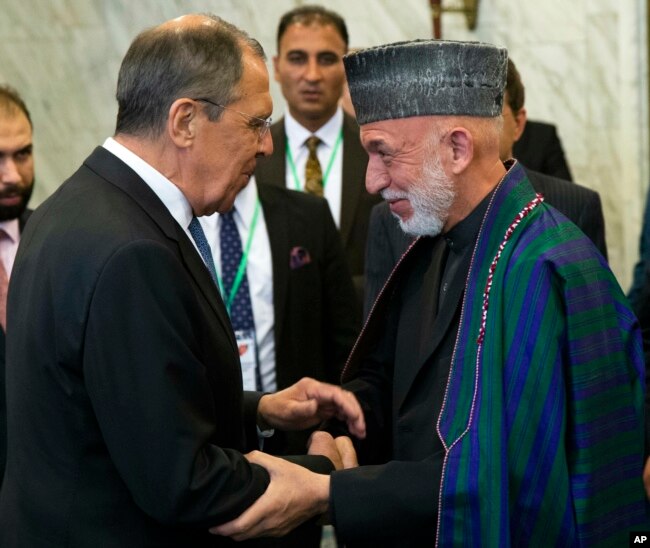Ayaz Gul
 The Taliban and Russia have jointly called for the withdrawal of U.S.-led coalition troops from Afghanistan, with a top leader of the Islamist insurgent group denouncing the foreign presence in the country as a major obstacle to Afghan peace.
The Taliban and Russia have jointly called for the withdrawal of U.S.-led coalition troops from Afghanistan, with a top leader of the Islamist insurgent group denouncing the foreign presence in the country as a major obstacle to Afghan peace.
Mullah Abdul Ghani Baradar, the political deputy of the Taliban, made the remarks in Moscow to a gathering of Russian and Afghan government personnel, as well as representatives from prominent political groups from the war-torn country.
Russia organized the meeting to mark the 100th anniversary of diplomatic relations with Afghanistan.
"The Islamic Emirate [Taliban] is truly committed to peace but the first step is to remove obstacles in the way of peace, meaning the occupation of Afghanistan must come to an end," Baradar said in rare public appearance and speech.
Russian Foreign Minister Sergey Lavrov in his welcome address to the group urged that foreign forces leave Afghanistan. He underscored the importance of bilateral relations, saying Russia is ready to offer more help to Afghanistan to fight terrorist groups led by Islamic State and drug-trafficking networks.
"This conflict in Afghanistan has no military solution and the only way to settle this issue is to rely on diplomacy and politics. We believe all foreign military [forces] should be withdrawn from the country and the society of Afghanistan should unite in finding a solution," the Russian foreign minister stressed.
"We believe that Afghanistan should stay united where all the ethnic groups can live peacefully. We hope that peace will settle in Afghanistan as soon as possible," Lavrov added, saying that accelerated Afghan peace-building efforts recently initiated by Moscow are furthering the peace process.
 Russian Foreign Minister Sergey Lavrov, left, and former Afghan President Hamid Karzai greet each other prior to their meeting in Moscow, May 28, 2019.
Russian Foreign Minister Sergey Lavrov, left, and former Afghan President Hamid Karzai greet each other prior to their meeting in Moscow, May 28, 2019.
Top Afghan candidates challenging President Ashraf Ghani in the upcoming presidential elections, former president, Hamid Karzai, and Afghan diplomats in Moscow, as well as the head of the official Afghan High Peace Council (HPC) tasked with promoting peace, were in attendance at Tuesday's meeting and delivered their own speeches.
In his address, the HPC chief, Karim Khalili, emphasized the need for agreeing to "a dignified and just mechanism" for ending years of bloodshed in Afghanistan.
Mullah Baradar
Mullah Baradar, who is heading a 14-member Taliban delegation, was the center of attention during Tuesday's meeting in Moscow. He is known as a co-founder of the Islamist Taliban and is believed to have played a central role in organizing insurgent activities after the U.S.-led military invasion of Afghanistan 17 years ago.
Baradar was traveling through Pakistan in 2010 when American security operatives, together with local counterparts, arrested him in Karachi. The insurgent commander was then placed in Pakistani custody until late last year. At that point, Washington requested that Islamabad free Baradar to push a nascent process of negotiations that U.S. diplomats initiated with the Taliban late last fall to seek an end to the Afghan war.
Intra-Afghan conference
Taliban and Afghan delegates also are scheduled to hold an intra-Afghan meeting on Wednesday to discuss ways to promote peace in their country.
The bilateral talks would mark the second time Taliban officials have met with Afghan opposition politicians in Russia. The first such interaction took place in February, but no government representatives were present because of objections by the insurgents.
The Taliban clarified in a statement issued late Tuesday that no Kabul government representatives will participate in the intra-Afghan conference, and insurgent delegates will interact only with Afghan politicians as well as civil society representatives. The Taliban refuse to engage in any peace talks with anyone associated with the U.S.-backed Kabul government, dismissing them as "stooges" installed by foreign "occupation" forces.
"The delegation of Islamic Emirate [Taliban] will also hold closed-door meetings with senior officials of the Russian Federation," said Taliban spokesman Zabihullah Mujahid.
U.S.-Taliban talks
The meetings in Moscow come as months of direct peace negotiations between the United States and the Taliban appear to have slowed down, if not deadlocked, over the insurgents' refusal to cease hostilities until all U.S.-led international forces withdraw from Afghanistan.
Washington has linked its troop withdrawal move to counterterrorism assurances by the Taliban, a comprehensive cease-fire and the insurgent group's participation in a peace dialogue with the Afghan government and other groups to end years of hostilities.
The U.S.-led military invasion ousted the Taliban from power in late 2001 for sheltering al-Qaida leaders blamed for the 9/11 terrorist attacks on American cites. The Islamist group rejected the charges and has since retaken control or influences nearly half of the country, inflicting heavy casualties on American-backed and trained embattled Afghan security forces.
No comments:
Post a Comment